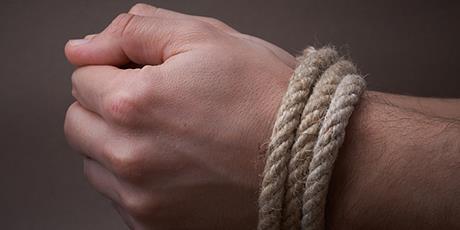Christian charity calls on parties to tackle human trafficking after damning MPs report
Parties are being urged to tackle the 'inexcusable' lack of support for human trafficking victims after a report by MPs blasted the UK's 'appalling' conviction record under Theresa May.
The estimated 10-13,000 slaves currently held in the UK receive 'unacceptable' levels of government help, MPs on the work and pensions committee said.

Their report published on Sunday found those who come forward to give evidence against their enslavers have ended up destitute meaning others opt not to testify against their abusers.
'Front line support is weak and uncoordinated and instances where a person is re-trafficked are not even recorded,' the report found.
'The lack of awareness, training and understanding, and lack of proper support for victims is having a negative impact on the number of successful prosecutions of slave masters,' the MPs added.
Despite Theresa May describing trafficking as a 'barbaric crime', victims are not offered any right to remain in the UK, meaning they can face a choice between deportation and being trafficked again.
Committee chair Frank Field said: 'When you consider what is at stake, there is a shocking lack of awareness and co-ordination in the front line services dealing with modern slavery.
'What these people go through is unimaginable, and yet it is happening, here, now, and our response seems almost lackadaisical,' he said.
'We don't even record instances where the same person is thrown back into this hell, even though that is surely the clearest sign of the failures in our response.'
Christian policy charity CARE called on the next government to make the issue a priority.
Louise Gleich, lead officer on trafficking who gave evidence to the committee, said: 'It's clear that current support for individuals recognised as human trafficking victims is inadequate and therefore in urgent need of reform.
'The special circumstances of human trafficking victims need to be recognised in the system and allowances made; all frontline staff at council offices and job centres need to be trained in how to respond to the needs of human trafficking victims and support them through the complexity of the benefits process.'
She added: 'CARE's end goal is that we want victims of human trafficking to be able to integrate into society and lead fulfilling lives, but this can only happen if we make it easy for victims to get the support and help that they need.'











